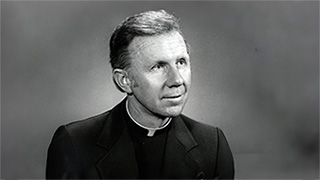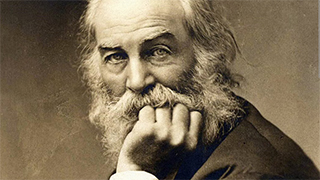Chad Thralls, Core Fellow and Author, Featured in Today's American Catholic
Wednesday, December 20, 2023
 University Core fellow and author Chad Thralls, Ph.D., published an essay in Today’s American Catholic (TAC). TAC is a nonprofit 501(c) (3) organization, described by its editorial team as "a
journal of inquiry, reflection, and opinion on matters of ecclesial, civic, and spiritual
life. TAC aims to promote religious dialogue and deepen the faith of our readers."
University Core fellow and author Chad Thralls, Ph.D., published an essay in Today’s American Catholic (TAC). TAC is a nonprofit 501(c) (3) organization, described by its editorial team as "a
journal of inquiry, reflection, and opinion on matters of ecclesial, civic, and spiritual
life. TAC aims to promote religious dialogue and deepen the faith of our readers."
The piece, "Courting Community," explores the writer’s lifelong love of basketball that continues to instill joy as it leads him through valuable life lessons on the courts of Seton Hall, playing noonball with a community of friends, colleagues and undergraduate students.
The essay lays out the establishment of this twice-a-week lunchtime basketball game between colleagues in their 30s and 40s from across all walks of University life, including priests, plumbers, professors, fundraisers, grounds and facilities staff, IT specialists, and staff from the mail room. Then came COVID, which thinned the core group of players.
This brought a new perspective on the game into focus.
After Covid, to keep the games going we began recruiting undergrads who happened to be getting shots up at the gym to play with us. In these situations, I sometimes get called on to guard the other team’s best player. This is increasingly becoming a challenge. Some of these guys are more athletic than I was at 18, and I turned 50 a few months ago. For example, I don’t generally guard a guy beyond the 3-point line. You’re going to have to prove to me that you can make that shot before I come out that far on the court. But if my man makes one, I go out to cover him. This becomes dicey with the young guns. If they are skilled with the hesitation dribble ("hesi") and are quicker than I am, it is tough for me to stay in front of them.
Early in the fall semester, we picked up a couple of guys who were planning on walking onto the men’s team. I was guarding one of them. Late in the game, the walk-on on my team asked if I wanted to switch, if I wanted him to guard my man. This had not happened to me before in over a decade of playing noonball. I carried this feeling of failure and embarrassment with me the rest of the day. When I walked to the train station that afternoon, this was the first thought that popped into my mind. I couldn’t stay in front of my man. I need to find some YouTube videos that show how to defend the hesi. I’m slipping. Man, I’m old.
A love of basketball takes on a new hue as lessons about life are being directly experienced. Thralls references passages from Ecclesiastes and Philippians to help introduce his point.
The first lesson it is teaching me is the reality of impermanence. Ecclesiastes 3:1-2 reads: "For everything there is a season and a time for every matter under heaven: a time to be born and a time to die; a time to plant and a time to pluck up what is planted." A time to play basketball competitively, and a time to find other forms of exercise. I know this intellectually, but I feel it lately.
Likewise, Philippians 2:5-7 states: "Let the same mind be in you that was in Christ Jesus,
who, though he existed in the form of God,
did not regard equality with God
as something to be grasped,
but emptied himself,
taking the form of a slave,
assuming human likeness."
The lesson of impermanence leads to a greater understanding of the inevitability of change.
In his concluding passage, Thralls connects sports, religion, and life.
Participating in noonball is not just about the basketball; it’s also about the community. Despite the ubiquity of sports in our society, the concept of "team" runs against the grain of our hyper-individualistic culture. When I play, it’s not just about me and how many points I score. My enjoyment could not occur without all the other guys participating, even the guys who don’t play defense and don’t pass. Some of my favorite memories of attending church include the time spent catching up with friends in the pews after the service. At this point in my noonball journey, I can’t imagine leaving the gym right after the game has ended to get back to work. The ritual is not complete until we sit in pools of sweat on the edge of the court and rehash the highlights of the game together. A game that no one cares about but us (except maybe my elementary school–age son, who loves hearing the gritty details). An experience that would not be fulfilling if all of us didn’t participate. A run that we will come back for again and again, as long as our knees last.
Professor Thralls is a Teaching Fellow in the University Core and a member of Seton Hall's Contemplative Pedagogy Group. His book, Deep Calls to Deep: Mysticism, Scripture, and Contemplation (Orbis Books, October 2020), is based on his own contemplative experience and Biblical knowledge. As described on the Orbis website, Deep Calls to Deep "explores mysticism through the text Christians already read, the Bible. It explores the metaphors and images found in scripture and the contemplative tradition that can enliven the spiritual imaginations of Christians. Highlighting these treasures illuminates fresh possibilities for understanding scripture for envisioning God, the human person, our connections to our fellow human beings, and how we live in relation to the natural world."
Thralls’ research interests include Christian contemplative spirituality and mysticism, spirituality and place, and comparative theology, especially Christianity and Zen Buddhism. Bringing his research interest in contemplative spirituality into the classroom, in all of his courses, he offers instruction on how to meditate and begins each class session with meditation, which offers students a moment to pause in the middle of their daily schedules.
Earlier this year, he published "Vast Space, Vast Self: Reflections on Spirituality and Commuting in New York," in Spiritus: A Journal of Christian Spirituality 23, no. 1 (spring 2023): 135-145, Johns Hopkins University Press.
Read the full essay, "Courting Community," in Today’s American Catholic.
Categories: Campus Life






